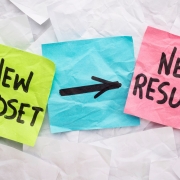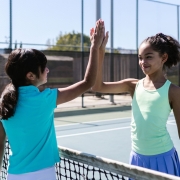Nurturing Champions: The Role of Emotional Intelligence in Teen Girl Athletes’ Success
In the world of sports, success is not only determined by physical prowess but also by mental strength. For teen girl athletes, navigating the challenges of adolescence while excelling in their chosen sport requires a unique set of skills. One crucial aspect that often gets overlooked is emotional intelligence (EI). In this blog, we’ll explore the intersection of emotional intelligence and behavior in the lives of teen girl athletes, shedding light on how honing these skills can lead to not only athletic success but also personal growth.
Understanding Emotional Intelligence:
Emotional intelligence encompasses the ability to recognize, understand, and manage our own emotions while also being attuned to the emotions of others. For teen girl athletes, this means developing self-awareness, self-regulation, empathy, and effective interpersonal skills. Let’s delve into each of these components and understand their significance in the context of sports and personal development.
Self-Awareness:
Teen athletes must recognize and understand their own emotions. This self-awareness enables them to navigate the highs and lows of competition, manage stress, and make informed decisions. Coaches and parents play a pivotal role in fostering an environment where girls feel encouraged to reflect on their emotions without judgment.
Self-Regulation:
The ability to regulate emotions is crucial in the heat of competition. Teaching teen athletes techniques such as mindfulness, deep breathing, or visualization can help them stay focused and composed under pressure. Learning to channel nervous energy positively can make a significant difference in performance.
Empathy:
Building empathy is essential for understanding teammates, opponents, and even coaches. Teen girl athletes who can empathize with others are better equipped to communicate effectively, resolve conflicts, and build strong, supportive team dynamics. This skill extends beyond the field and into their everyday lives.
Interpersonal Skills:
Strong interpersonal skills contribute to effective communication, leadership, and collaboration. Teen athletes need to navigate relationships not only within their teams but also with coaches, parents, and peers. Developing respectful and assertive communication skills enhances their ability to express themselves and handle conflicts constructively.
Behavioral Impact of Emotional Intelligence:
Resilience in the Face of Setbacks:
Teen girl athletes who possess high emotional intelligence are more resilient in the face of setbacks. They view challenges as opportunities for growth rather than insurmountable obstacles. This mindset fosters perseverance and a positive attitude, crucial elements for long-term success.
Healthy Competition:
Emotional intelligence helps athletes strike a balance between healthy competition and good sportsmanship. It encourages them to celebrate victories with humility and learn from defeats rather than dwelling on them negatively. This approach contributes to a positive and supportive sports culture.
Balancing Priorities:
Teen athletes often juggle academics, sports, and social commitments. Emotional intelligence enables them to manage their time effectively, set realistic goals, and prioritize tasks. This skill is not only beneficial for their athletic endeavors but also sets the foundation for a balanced and fulfilling life.
In the world of teen girl athletes, emotional intelligence is a game-changer. By fostering self-awareness, self-regulation, empathy, and interpersonal skills, these young athletes can navigate the complexities of both their sports and personal lives with grace. Coaches, parents, and mentors play a crucial role in nurturing these skills, creating an environment where emotional intelligence is valued alongside physical prowess. As we empower the next generation of female athletes, let’s recognize that true success extends far beyond the scoreboard, encompassing personal growth, resilience, and the development of well-rounded individuals poised to make a lasting impact on and off the field.












